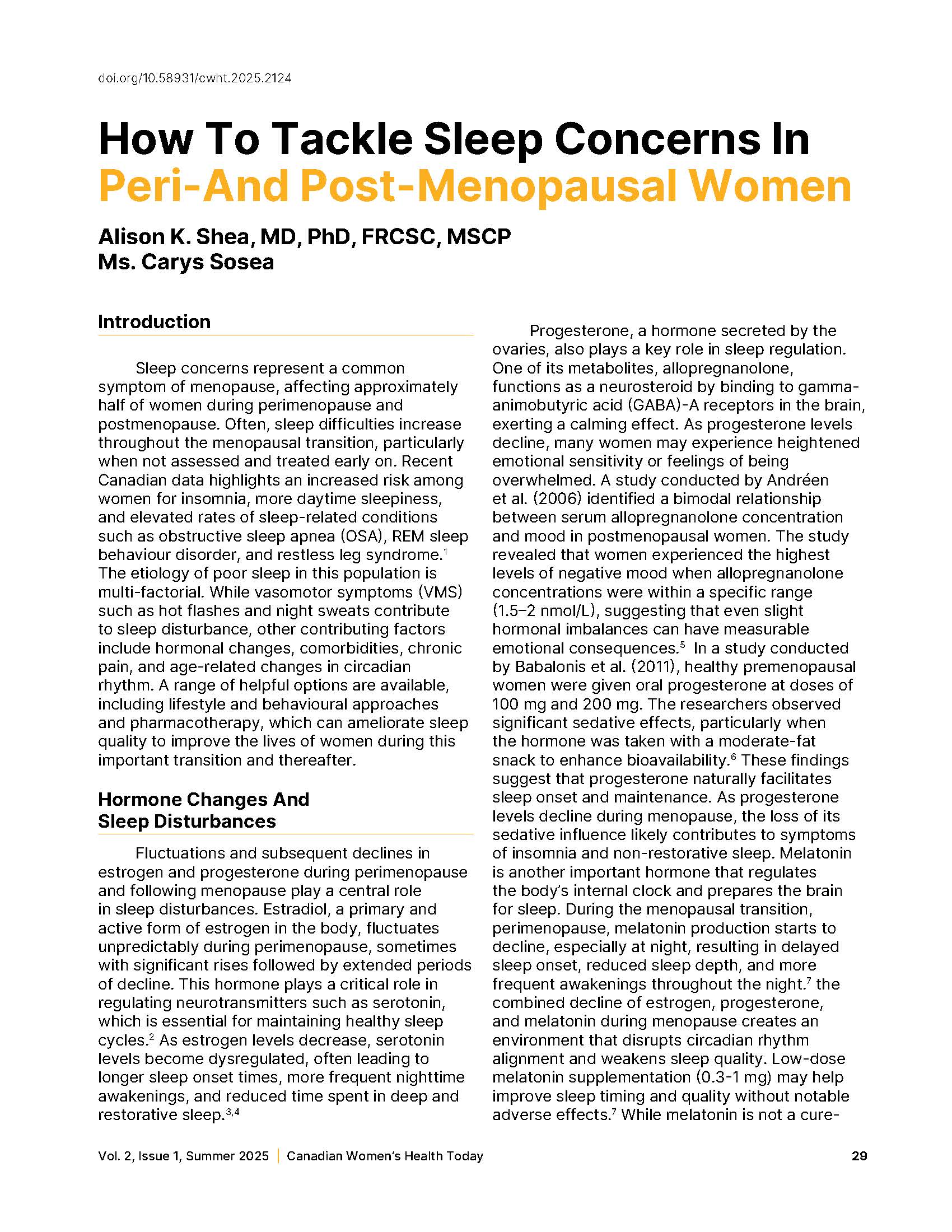How To Tackle Sleep Concerns In Peri-And Post-Menopausal Women
DOI:
https://doi.org/10.58931/cwht.2025.2124Abstract
Sleep concerns represent a common symptom of menopause, affecting approximately half of women during perimenopause and postmenopause. Often, sleep difficulties increase throughout the menopausal transition, particularly when not assessed and treated early on. Recent Canadian data highlights an increased risk among women for insomnia, more daytime sleepiness, and elevated rates of sleep-related conditions such as obstructive sleep apnea (OSA), REM sleep behaviour disorder, and restless leg syndrome. The etiology of poor sleep in this population is multi-factorial. While vasomotor symptoms (VMS) such as hot flashes and night sweats contribute to sleep disturbance, other contributing factors include hormonal changes, comorbidities, chronic pain, and age-related changes in circadian rhythm. A range of helpful options are available, including lifestyle and behavioural approaches and pharmacotherapy, which can ameliorate sleep quality to improve the lives of women during this important transition and thereafter.
References
Zolfaghari S, Keil A, Pelletier A, Postuma RB. Sleep disorders and mortality: a prospective study in the Canadian longitudinal study on aging. Sleep Med. 2024;114:128–136. doi:10.1016/j.sleep.2023.12.023
Turek J, Gasior L. Estrogen fluctuations during the menopausal transition are a risk factor for depressive disorders. Pharmacol Rep. 2023;75(1):32–43. doi:10.1007/s43440-022-00444-2
Joffe H, de Wit A, Coborn J, Crawford S, Freeman M, Wiley A, et al. Impact of estradiol variability and progesterone on mood in perimenopausal women with depressive symptoms. J Clin Endocrinol Metab. 2020;105(3):e642–650. doi:10.1210/clinem/dgz181
Baker FC, Lampio L, Saaresranta T, Polo-Kantola P. Sleep and sleep disorders in the menopausal transition. Sleep Med Clin. 2018;13(3):443–456. doi:10.1016/j.jsmc.2018.04.011
Andréen L, Sundstrom-Poromaa I, Bixo M, Nyberg S, Backstrom T. Allopregnanolone concentration and mood--a bimodal association in postmenopausal women treated with oral progesterone. Psychopharmacology (Berl). 2006;187(2):209–221. doi:10.1007/s00213-006-0417-0
Babalonis S, Lile JA, Martin CA, Kelly TH. Physiological doses of progesterone potentiate the effects of triazolam in healthy, premenopausal women. Psychopharmacology (Berl). 2011;215(3):429–439. doi:10.1007/s00213-011-2206-7
Jehan S, Jean-Louis G, Zizi F, Auguste E, Pandi-Perumal SR, Gupta R, et al. Sleep, melatonin, and the menopausal transition: what are the links? Sleep Sci. 2017;10(1):11–18. doi:10.5935/1984-0063.20170003
Thurston RC, Chang Y, von Kanel R, Barinas-Mitchell E, Jennings JR, Hall MH, et al. Sleep characteristics and carotid atherosclerosis among midlife women. Sleep. 2017;40(2). zsw052. doi:10.1093/sleep/zsw052
Maas AH, Franke HR. Women's health in menopause with a focus on hypertension. Neth Heart J. 2009;17(2):68–72. doi:10.1007/BF03086220
Jehan S, Masters-Isarilov A, Salifu I, Zizi F, Jean-Louis G, Pandi-Perumal SR, et al. Sleep disorders in postmenopausal women. J Sleep Disord Ther. 2015;4(5):212.
Saaresranta T, Anttalainen U, Polo O. Sleep disordered breathing: is it different for females? ERJ Open Res. 2015;1(2): 00063-2015. doi:10.1183/23120541.00063-2015
Babson KA, Feldner MT, Badour CL. Cognitive behavioral therapy for sleep disorders. Psychiatr Clin North Am. 2010;33(3):629–640. doi:10.1016/j.psc.2010.04.011
Qaseem A, Kansagara D, Forciea MA, Cooke M, Denberg TD, Clinical Guidelines Committee of the American College of Physicians. Management of Chronic Insomnia Disorder in Adults: A Clinical Practice Guideline From the American College of Physicians. Ann Intern Med. 2016;165(2):125–133. doi:10.7326/M15-2175
Moloney ME, Konrad TR, Zimmer CR. The medicalization of sleeplessness: a public health concern. Am J Public Health. 2011;101(8):1429–1433. doi:10.2105/AJPH.2010.300014
Geiger PJ, Eisenlohr-Moul T, Gordon JL, Rubinow DR, Girdler SS. Effects of perimenopausal transdermal estradiol on self-reported sleep, independent of its effect on vasomotor symptom bother and depressive symptoms. Menopause. 2019;26(11):1318–1323. doi:10.1097/GME.0000000000001398
Ensrud KE, Guthrie KA, Hohensee C, Caan B, Carpenter JS, Freeman EW, et al. Effects of estradiol and venlafaxine on insomnia symptoms and sleep quality in women with hot flashes. Sleep. 2015;38(1):97–108. doi:10.5665/sleep.4332
Jiang K, Jin Y, Huang L, Feng S, Hou X, Du B, et al. Black cohosh improves objective sleep in postmenopausal women with sleep disturbance. Climacteric. 2015;18(4):559–567. doi:10.3109/13697137.2015.1042450

